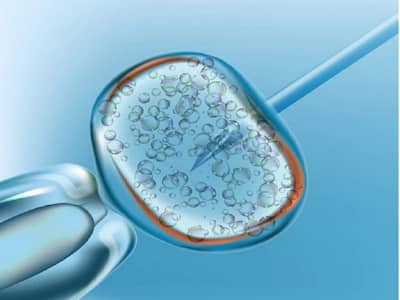
Is egg freezing safe? What is the ideal time to freeze my eggs? IVF Specialist Dr. Shobha Gupta answers FAQs about egg freezing.
A female has a particular number of eggs in her ovaries when she is born, usually in the range of 400,000. Her egg supply gradually declines as she ages. During her reproductive years, each menstrual cycle typically uses up between 100 and 200 eggs. Additionally, women often have 1,000 to 2,000 eggs that are no longer usable as menopause approaches because the majority of their viable eggs have already been used up. This may make it more challenging for women to get pregnant. In addition, as women get older, they may also get certain medical disorders that can affect their ability to conceive even more.
Egg freezing gives women a reproductive choice
Egg freezing, a procedure in which a woman’s eggs are extracted, frozen, and preserved to allow her to have a child later, has broken taboos and is gradually becoming a viable option for many women in India. For some, it’s empowerment, for others it’s career demands, late marriage, the decision to delay having a child, or a medical condition.
According to Dr. Shobha Gupta, Medical Director and IVF Specialist at Mother’s Lap IVF Centre in New Delhi and Vrindavan, “Egg freezing allows women to delay pregnancy until a later stage and gives them a reproductive choice wherein their biological clock doesn’t come in the way of having a child.”
Dr. Shobha Gupta receives ten to fifteen inquiries each month about egg freezing, which suggests that more women are now interested in the procedure.
The ideal time to freeze your eggs
Egg freezing, also known as oocyte cryopreservation in medicine, is a method of preserving fertility in which eggs are removed from the ovaries following stimulation and then cryopreserved for future use. Consequently, the woman will always be able to conceive children of her own genetic line. The optimal time to freeze one’s eggs is in one’s late twenties or early thirties because fertility starts to fall by the time a woman turns 35 and drastically decreases by the time she turns 40.
Peak fertility, according to Dr. Shobha Gupta, occurs in the early 20s, when monthly pregnancy rates are around 25%. Pregnancy rates for women in their thirties drop to 15% each month, and by the time they reach their forties, they are, on average, at 5% per month.
Egg freezing guarantees that women will be able to use their own eggs and produce biological children later, despite the fact that early menopause and early ovarian failure can also limit egg production.
After a woman reaches the age of 35, her egg production decreases, and by the age of 40, her chance of miscarriage has increased to about 45%. The likelihood of miscarriage by the time she is 45 is up to 75%. Early egg freezing increases the chance of having a healthy kid later. According to studies, women who freeze their eggs before the age of 35 are more likely to conceive than those who do so later. This is due to the fact that the more eggs that are gathered and frozen, the higher the chance of a successful pregnancy.
Frozen eggs are thought to be usable for up to 10 years. However, the cost of the procedure currently starts at Rs. 1.5 lakh.
READ RELATED: Intranasal Immunotherapy Offers Hope for Alzheimer’s Patients
Tests that are necessary before egg freezing
Before a woman may apply, there is a thorough screening process as well. “In addition to a few standard tests, such as thyroid profile and haemoglobin, and screening for infectious disorders including HIV, Hepatitis B, and Hepatitis C, the required screening includes an ovarian reserve test to determine the quality and amount of eggs produced by a woman” explained Dr. Shobha Gupta.
Despite their interest, many women are hesitant because of the success rate. However, thanks to advancements in medical technology, the procedure is now more effective. It is now more likely to use vitrification or flash freezing to preserve the eggs for subsequent thawing. Because the eggs are frozen so quickly, potentially harmful ice crystals are prevented from forming.
Yes, egg freezing is safe
Even though the technique is identical to IVF, egg freezing is usually regarded as a safe procedure with minor risks.
“In order to boost her chances of conceiving, a woman often needs to retain more eggs ideally, around 10-15. A woman is advised to take specific drugs, the majority of which are injectable, to encourage the development of several eggs in order to do this. The operation is the removal of the eggs vaginally while the patient is under light anaesthesia,” Dr. Shobha Gupta.
However, before undergoing this procedure, be sure to have a thorough discussion with your doctor about your specific needs for egg freezing, not for just current trends, concluded Dr. Shobha Gupta.
Total Wellness is now just a click away.
Follow us on
Don’t Miss Out on the Latest Updates.
Subscribe to Our Newsletter Today!
window.addEventListener(‘load’, (event) => {
$(‘#commentbtn’).on(“click”,function(){
(function(d, s, id) { var js, fjs = d.getElementsByTagName(s)[0]; if (d.getElementById(id)) return; js = d.createElement(s); js.id = id; js.src = “//connect.facebook.net/en_US/sdk.js#xfbml=1&version=v2.3”; fjs.parentNode.insertBefore(js, fjs);}(document, ‘script’, ‘facebook-jssdk’));
$(“.cmntbox”).toggle();
});
});









